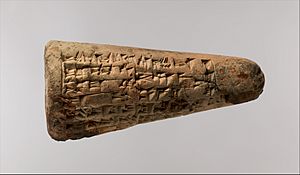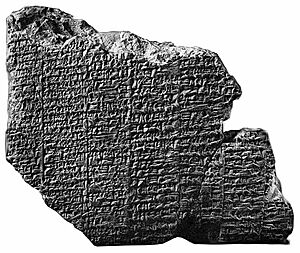Lipit-Ishtar facts for kids
Quick facts for kids Lipit-Ishtar |
|
|---|---|
| King of Isin | |

Votive cone with cuneiform inscription of Lipit-Eshtar
|
|
| Reign | fl. c. 1870 BC — c. 1860 BC |
| Predecessor | Išme-Dagān |
| Successor | Ur-Ninurta |
| Akkadian | Lipit-Ištar |
| House | First Dynasty of Isin |
Lipit-Ishtar was an important king who ruled the ancient city of Isin a very long time ago. He was king around 1870 to 1860 BC. He was the fifth king of his family line, known as the First Dynasty of Isin.
Lipit-Ishtar became king after Ishme-Dagan. After Lipit-Ishtar, Ur-Ninurta became the next king. We know about Lipit-Ishtar from old writings and special songs written to honor him. He is most famous for a set of laws, called the "Code of Lipit-Ishtar." This code was written about 100 years before the famous Code of Hammurabi. These laws were so important that they were used to teach students for hundreds of years after Lipit-Ishtar's time. Records from his reign also say that he successfully pushed back against a group of people called the Amorites.
Contents
The Code of Lipit-Ishtar
The "Code of Lipit-Ishtar" is a collection of laws from ancient Sumer. These laws were written on clay tablets. They help us understand what life was like and how people were expected to behave in Lipit-Ishtar's kingdom. Here are some examples of the laws:
Laws About Property and Land
- If someone was given empty land to plant an orchard but did not finish planting it, they had to give the empty part of the land to the person who was supposed to plant it.
- If a person went into someone else's orchard and was caught stealing, they had to pay ten shekels of silver. A shekel was a unit of weight, often used for money.
- If a person cut down a tree in someone else's garden, they had to pay half a mina of silver. A mina was a larger unit of weight than a shekel.
- If a person's empty land next to another person's house was not taken care of, and the house owner worried about thieves, the land owner had to make sure their land was secure. If anything was stolen from the house because the land was not secure, the land owner had to pay for what was lost.
Laws About People and Servants
- If a slave ran away into the city and stayed in another person's house for a month, the person who hid the slave had to give one of their own slaves in return.
- If the person who hid the slave did not have a slave to give, they had to pay fifteen shekels of silver.
- If a slave paid their master twice the amount they were worth, that slave could become free.
- A "miqtum" was a type of servant given by the king. If a king gave someone a miqtum, that servant could not be taken away from them.
- If a miqtum chose to go to another person on their own, that person could not keep them. The miqtum was free to go wherever they wanted.
- If someone forced another person into an agreement they knew nothing about, that agreement was not valid. The person who made the false agreement would be punished.
Laws About Family and Inheritance
- If a father was still alive, his daughter, even if she was a priestess, could live in his house and inherit property just like a son.
- If a man married a second wife and she had children, the special gifts she brought from her father's house (called a dowry) belonged to her children. However, all the children from both wives would share their father's other property equally.
- If a man had children with his wife, and also had children with a slave, but then set the slave and her children free, the slave's children would not share the family property with the children of their former master.
- If a man was going to marry a woman and moved into her father's house, but then they decided not to marry and gave the woman to someone else, they had to give back any gifts he had brought for the marriage. The woman could not then marry the man's friend.
Laws About Animals
- If a person rented an ox and hurt its nose, they had to pay one-third of the ox's price.
- If a person rented an ox and damaged its eye, they had to pay half of its price.
- If a person rented an ox and broke its horn, they had to pay one-fourth of its price.
- If a person rented an ox and damaged its tail, they had to pay one-fourth of its price.
See also
 In Spanish: Lipit-Ishtar para niños
In Spanish: Lipit-Ishtar para niños
 | Stephanie Wilson |
 | Charles Bolden |
 | Ronald McNair |
 | Frederick D. Gregory |


